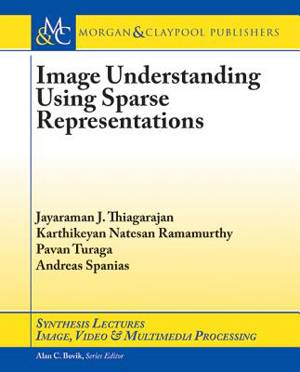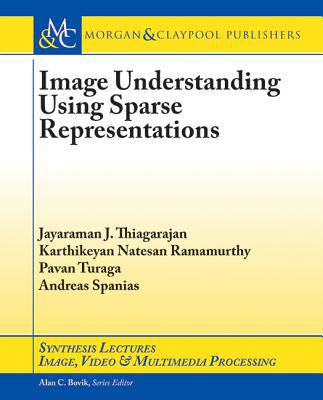
Door een staking bij bpost kan je online bestelling op dit moment iets langer onderweg zijn dan voorzien. Dringend iets nodig? Onze winkels ontvangen jou met open armen!
- Afhalen na 1 uur in een winkel met voorraad
- Gratis thuislevering in België vanaf € 30
- Ruim aanbod met 7 miljoen producten
Door een staking bij bpost kan je online bestelling op dit moment iets langer onderweg zijn dan voorzien. Dringend iets nodig? Onze winkels ontvangen jou met open armen!
- Afhalen na 1 uur in een winkel met voorraad
- Gratis thuislevering in België vanaf € 30
- Ruim aanbod met 7 miljoen producten
Zoeken
Image Understanding Using Sparse Representations
Jayaraman J Thiagarajan
€ 34,95
+ 69 punten
Uitvoering
Omschrijving
Image understanding has been playing an increasingly crucial role in several inverse problems and computer vision. Sparse models form an important component in image understanding, since they emulate the activity of neural receptors in the primary visual cortex of the human brain. Sparse methods have been utilized in several learning problems because of their ability to provide parsimonious, interpretable, and efficient models. Exploiting the sparsity of natural signals has led to advances in several application areas including image compression, denoising, inpainting, compressed sensing, blind source separation, super-resolution, and classification. The primary goal of this book is to present the theory and algorithmic considerations in using sparse models for image understanding and computer vision applications. To this end, algorithms for obtaining sparse representations and their performance guarantees are discussed in the initial chapters. Furthermore, approaches for designing overcomplete, data-adapted dictionaries to model natural images are described. The development of theory behind dictionary learning involves exploring its connection to unsupervised clustering and analyzing its generalization characteristics using principles from statistical learning theory. An exciting application area that has benefited extensively from the theory of sparse representations is compressed sensing of image and video data. Theory and algorithms pertinent to measurement design, recovery, and model-based compressed sensing are presented. The paradigm of sparse models, when suitably integrated with powerful machine learning frameworks, can lead to advances in computer vision applications such as object recognition, clustering, segmentation, and activity recognition. Frameworks that enhance the performance of sparse models in such applications by imposing constraints based on the prior discriminatory information and the underlying geometrical structure, and kernelizing the sparse coding and dictionary learning methods are presented. In addition to presenting theoretical fundamentals in sparse learning, this book provides a platform for interested readers to explore the vastly growing application domains of sparse representations.
Specificaties
Betrokkenen
- Auteur(s):
- Uitgeverij:
Inhoud
- Aantal bladzijden:
- 118
- Taal:
- Engels
- Reeks:
Eigenschappen
- Productcode (EAN):
- 9781627053594
- Verschijningsdatum:
- 1/04/2014
- Uitvoering:
- Paperback
- Formaat:
- Trade paperback (VS)
- Afmetingen:
- 190 mm x 235 mm
- Gewicht:
- 217 g

Alleen bij Standaard Boekhandel
+ 69 punten op je klantenkaart van Standaard Boekhandel
Beoordelingen
We publiceren alleen reviews die voldoen aan de voorwaarden voor reviews. Bekijk onze voorwaarden voor reviews.











